#10: Bad Boy by the Jive Bombers
City: Dauphin, MB
Radio Station: CKDM
Peak Month: March 1957
Peak Position in Dauphin ~ #9
Peak position in Vancouver ~ did not chart
Peak Position on Billboard Hot 100 ~ #36
YouTube: “Bad Boy”
Lyrics: “Bad Boy”
The Jive Bombers were an R&B doo wop group whose members consisted of Clarence Palmer, William “Pee Wee” Tinney, Al Tinney, and Earl Johnson. Palmer was born in 1911, in Pawtucket, Rhode Island, and was stricken with polio as a child. He was the lead vocalist for the Jive Bombers. Al Tinney was born in Alsonia, CT, in 1921, and his brother “Pee Wee” Tinney was born in 1930. Earl Johnson was born in 1932. Al Tinney was a child actor and appeared in the Broadway cast of Porgy and Bess starting in October 1935 at the Alvin Theater in Manhattan. The Tinney brothers , Pee Wee and Al, had both been part of the cast of a 1938 Broadway musical, Sing Out The News. Al Tinney was part of the band that played at Monroe’s Uptown House at 198 West 134th St in Harlem. Tinney was with the band from 1939 to 1943. Others in the house band at the time included saxophonist Charlie Parker, drummer Max Roach, trumpeters Vic Coulsen, Benny Harris, and George Treadwell. Al Tinney was drafted into the United States Army in 1943, and served until 1946.
By 1928, Clarence Palmer, and his brothers Dick and Ernest, were appearing in vaudeville acts at Connie’s Inn in Harlem. The three brothers appeared in a November 1929 production of Adam And Eve In Harlem at the Lafayette Theater. In the early ’30s they performed at Philadelphia’s Pearl Theater, and Harlem’s Renaissance Casino, Apollo Theater and Cotton Club. In October 1932, they were part of a “Roosevelt for President” show. They shared the stage back then with Alberta Hunter, Cab Calloway, Benny Cater and Lucky Millinder. They were also heard on the radio. The Palmer Boys were part of the vanguard that turned the Apollo Theater from a club for white performers to one that became to almost exclusively feature black musicians. In addition to playing musical instruments and singing, they also tap danced.
In 1934, Clarence Palmer was a vocalist on the Luis Russell and His Orchestra tune “Ghost of the Freaks”. In 1936, they recorded a few songs with Earl Hines. In 1937, Clarence Palmer was a lead vocalist on the jazz-swing tune “You Showed Me The Way” recorded by Frankie Newton and His Uptown Serenaders. In March 1938, the Palmer Brothers became part of Joe Bostic’s “Tales Of Harlem” radio program. Around 1939-40, Palmer was a vocalist on the recording of “Hep Cats Ball” with Louis Armstrong. They also were part of Count Basie’s band, and recorded vocals on over a half dozen tracks for Cab Calloway in the early ’40s. In 1946, Palmer’s song “Baby, That’ll Be The Day”, was recorded by Roy Eldridge And His Orchestra. By 1947, “Pee Wee” Tinney was in the recording studio with the jazz group Babs’ 3 Bips and a Bop, who recorded with the Blue Note label. He also performed and recorded with Cootie Williams Orchestra in the late ’40s. Earl Johnson played tenor saxophone on a number of recordings in the 1940s for saxophonist, clarinetist and occasional singer, “Deacon” Lem Johnson, and also with Doc Sausage.
Clarence Palmer and “Pee Wee” Tinney met as part of an R&B group called the short-lived Jivenaires. After the lead singer of the group died in a motor vehicle accident in November 1948, Palmer and “Pee Wee” Tinney kept in touch. In 1949, Pee Wee Tinney recorded as part of Al Sears and the Sparrows.
In 1949, the Jive Bombers formed and recorded their first single, “Brown Boy” in December of that year. In addition to Clarence Palmer, Al and Pee Wee Tinney, the other original member was Charlie Lee. They released a half dozen singles into the early ’50s, and performed at clubs in Maryland, New York and Pennsylvania. By late 1951, Earl Johnson replaced Charlie Lee on saxophone.
In January 1952, they won on the Arthur Godfrey Talent Scouts show. A notice at the Bamboo Cafe at 145 West 47th Street in New York made reference to their achievement. They released three singles on the Citation label. For a few years the Jive Bombers were off the radar, at least according to Marv Goldberg, who notes the absence of the Jive Bombers appearing in bills for clubs at the time. By November 1956, the group had a new manager. They recorded a number of singles, including “Bad Boy”, which was a remake of “Brown Boy”.
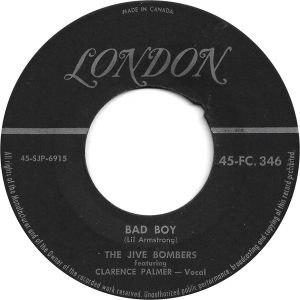
In 1936, the wife of Louis Armstrong, Lil Armstrong, wrote “Brown Gal” and recorded the song with Louis playing trumpet in the background. Lil Hardin Armstrong (February 3, 1898 — August 27, 1971) was a jazz pianist, composer, arranger, singer, and bandleader. She learned to play piano by Grade Three in public school. By the age of twenty, Lil Hardin got work as a sheet music demonstrator at Jones Music Store in Memphis. She got work with clarinetist and bandleader, Lawrence Duhé. Subsequently, she was with King Oliver’s Creole Jazz Band. In 1924, she married Louis Armstrong. In the 1930s, she became a bandleader with the mixed-race “All Girl Orchestra”. In the 1930s, Lil Armstrong’s other compositions include “Struttin’ with Some Barbecue”, “Don’t Jive Me”, “Two Deuces”, “Knee Drops”, “Doin’ the Suzie-Q” and “Just for a Thrill”. She was the second wife of Louis Armstrong with whom she collaborated on many recordings in the 1920s. She divorced the bandleader in 1938. She worked into the ’40s as a pianist and singer. In the late 1940s and early 1950s, Hardin worked mostly as a soloist, singing and playing piano. In the late 1940s, she decided to leave the music business and become a tailor, so she took a course in tailoring.
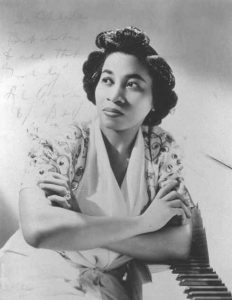
When Louis Armstrong died in 1971, she traveled to New York for the funeral and rode in the family car. Returning to Chicago, she felt that work on her autobiography could continue, but the following month, performing at a televised memorial concert for Armstrong, she collapsed at the piano and died from a heart attack on the way to the hospital. She was 68.
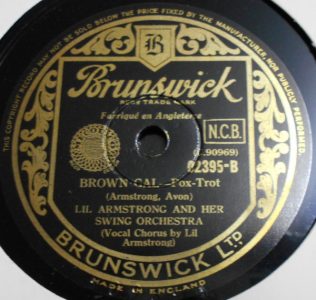
“Brown Gal” on the Brunswick label when released in 1936 in the UK. Credits for the song are both Lil Armstrong and Avon Long. Born in Baltimore in 1910, Avon Long was in a musical in 1934 with Lena Horne called Cotton Club Parade. While in 1935, Long appeared as a Cotton Club dancer in the film short Cab Calloway’s Jitterbug Party. He wrote a few songs more songs recorded by the Ink Spots, as well as Lil Armstrong. Long performed in the Broadway musical Sportin’ Life in 1942, and Beggar’s Holiday in 1946. In 1945, he appeared in the film Zigfeld Follies, followed with Centennial Summer the next year.
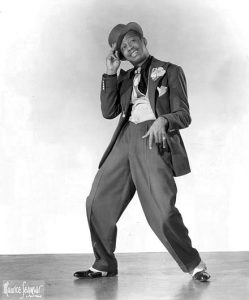
Avon Long
In 1952, he was part of the cast in the Broadway revival of the all-black cast performance of Shuffle Along, best known for the tune “I’m Just Wild About Harry”. In 1968, Long had a small part as a preacher in Finian’s Rainbow. In 1973, Long received a Tony Award nomination for Best Featured Actor in a Musical for his performance in Don’t Play Us Cheap. That year he also appeared in the Academy Award winning movie The Sting. While in 1974, he had a part in the Art Carney comedy film Harry and Tonto. In 1979 he played Chicken George Moore in the mini-series Roots: The Next Generations. In 19883, Avon Long was cast in the Dan Aykroyd-Eddie Murphy comedy Trading Places. His final role in a movie was in 1984 in the sci-fi film Nothing Lasts Forever. In 1984, Avon Long died of cancer at the age of 73.
In the original “Brown Gal” from 1936, the lyrics of Lil Armstrong and Avon Long include:
Now I’m mighty like a rose,
all dressed up in fancy clothes.
I’m just another brown gal that’s all full of vim,
Well, here’s the fix that I’m left in.
And I’m changing all my nights into days.
“Bad Boy” peaked at #2 in Toronto, #3 in Pittsburgh, #4 in Albany (NY) and Troy (NY), #5 in New Orleans, #6 in New York City, #7 in Detroit, #9 in Dauphin (MB), #10 in Portland (ME), and #11 in Baltimore and Providence (RI).
“Bad Boy” has been covered by Sha-Na-Na, Ringo Starr, and Mink DeVille.
“Bad Boy” was covered in February 1957 by Big Daddy and His Boys. This siphoned off some of the chart action the Jive Bombers hoped for. On February 16, 1957, the Jive Bombers appeared on Joe Bostic’s new WATV variety show Harlem Showcase, along with Varetta Dillard, and the Heartbeats. That Easter, the Jive Bombers appeared at a concert billed with Mickey & Sylvia, the Diamonds, the Clovers, Jo Ann Campbell, and others.
The Jive Bombers next release was a cover of the pop standard from the late ’20s, “If I Had A Talking Picture Of You”. Several other songs were recorded in the spring of 1957, but they didn’t catch on. The group performed at DJ Murray “the K” Kaufman’s show at Palisades Amusement Park on May 31, 1957. In June ’57, they headlined a show at the Apollo Theater, along with Faye “Shake A Hand” Adams, and a few other opening acts. Savoy Records kept releasing new material, including a cover of the pop standard “Stardust”. Of the five singles Savoy released, nothing clicked. Two other planned singles were not released by Savoy. Wayback Attack writer Michael Jack Kirby notes that the four or more singles released after “Bad Boy” all had the same sound. Clarence Palmer’s “la-la-la’s” were in each song, and the novelty had already worn off by the time the chart run for “Bad Boy” was done.
The Jive Bombers continued to appear at a variety of clubs. Columnist Dorothy Kilgallen noted on December 25, 1960, that the Jive Bombers had appeared at the Manhattan club Pillow Talk. Clarence Palmer left the group by late ’62. There were lineup changes that followed. The Jive Bombers released a single titled “Smirnoff Mule”, actually backing Carmen McRae. The group continued to perform from time to time until early 1969.
In 1968, Al Tinney moved to Buffalo, NY, where he worked locally in jazz music, did work in a state prison music program, and lectured at AUNY Buffalo. Later in life, Tinney often played at the historic Colored Musicians Club in downtown Buffalo or with Peggy Farrell’s house band. He recorded an album with Peggy Farrell (Margaret Alice Farrell), Peg & Al, for Border City Records in 2000. Al Tinney died in 2002 at the age of 81.
Clarence Palmer died at the age of 67 in New York City in 1978.
August 30, 2024
Ray McGinnis
References:
Marv Goldberg, “The Jive Bombers,” uncamarvy.com.
Michael Jack Kirby, “The Jive Bombers Bad Boy,” Wayback Attack.
Mary Kunz Gokldman, “Al Tinney, Admired Pianist with a Legacy of Bebop Jazz back to its birth, Dies at 81,” Buffalo News, December 13, 2002.
Lil Armstrong,” Brown Gal“, Decca Records, 1936.
“Actor Avon Long, who starred in the role of…,” UPI, February 15, 1984.
“While Playing Blues to Louis, Satchmo’s Ed-Wife Dies Here,” Chicago Tribune, August 28, 1971.
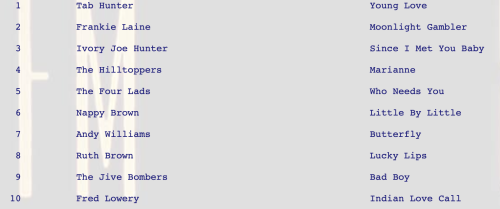
CKDM 730-AM Dauphin (MB) Top Ten | March 23, 1957

Leave a Reply